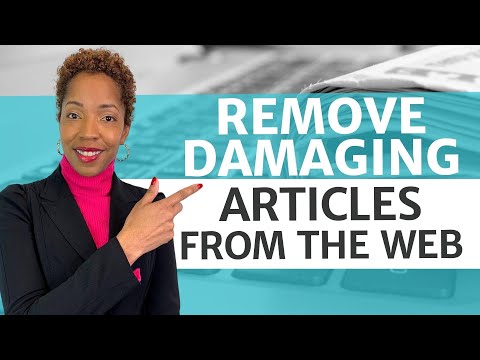Beyond SEO: Tackling Negative Publicity by Deleting Unwanted Articles from Googles Search Results

In today’s digital world, online info controls public opinion. Negative publicity can ruin companies & individuals. One way to fight this is to delete unwanted articles from Google’s search results.
Search engine optimization (SEO) is key to controlling the info that appears when someone searches your name/brand. SEO techniques can remove negative articles from search results. You can’t delete them from the web but can push them down in search results.
Understanding Negative Publicity and Its Impact
Negative publicity has a huge effect, from destroying reputations to reducing trust and ruining relationships. In the digital age, bad news spreads fast and can reach a vast audience in seconds. This amplifies the impact of negative publicity, so it’s important to grasp its implications.
Financial losses, missed growth chances, and even legal problems can result from negative publicity. It can shape public opinion and deter customers and investors. Individually, it can impede career progression by tarnishing personal reputations.
Negative publicity has lasting effects. Content published online can stay in search engine results, reappearing when people search related keywords and phrases. This visibility increases the impact over time.
To offset the damage, proactive steps are needed. Erasing articles from Google’s search results limits exposure to negative content. By taking charge of online presence and removing harmful content from search engine visibility, people and businesses can manage their narratives and reduce the lasting effects of bad publicity.
In today’s digital world, quickly recognizing and addressing any negative publicity is vital. Not taking action can mean missing out on chances while allowing negativity to overshadow successes. We can protect our reputations and open doors to a more positive future by deleting unwanted articles from search engine results.
Exploring the Importance of Online Reputation Management
In the digital age, a company’s online reputation is super important. Managing and safeguarding this reputation is essential for success today. ORM (Online Reputation Management) focuses on monitoring, influencing, and controlling what people see when they search for a brand or individual. Negative articles or reviews in search results can put off potential customers. Strategies must be used to ensure positive content is at the top. SEO tactics such as creating quality content, building backlinks from reliable sources, and leveraging social media can help. Engaging with customers and addressing their concerns promptly is beneficial. It shows commitment to customer satisfaction and builds trust. Also, positive relationships with key people in an industry can improve online reputation. Interviews and guest blog posts help showcase credibility and reach new people. Consistently tracking brand mentions and responding to negative publicity is vital. Monitoring conversations across social media, forums, news sites, etc., can be done with dedicated tools. Quick responses to any misconceptions or negative experiences can prevent damage. Exploring ORM techniques is necessary for long-term success. Combining SEO strategies, customer engagement, collaboration with industry leaders, and proactive monitoring of brand mentions can help maintain a positive image.
Step-by-Step Guide to Removing Unwanted Articles from Google’s Search Results
Removing unwanted articles from Google’s search results can be tough. But with the right approach, it is possible to reduce negative publicity. Here is a step-by-step guide to help you.
- Assess:
- Analyze the article’s impact.
- Determine if legal action is needed.
- Contact the Website Owner:
- Find the website that published the article.
- Explain your concerns and request removal.
- Provide evidence, such as false info or privacy violations.
- Submit a Content Removal Request:
- If the website owner doesn’t help, submit a legal request.
- Follow Google’s guidelines for content removal requests.
- Include URLs and reasons for removal.
- Strengthen Online Presence:
- Wait for removal requests by building a positive online presence.
- Create engaging content on multiple platforms.
- Optimize your website with relevant keywords.
Monitor the situation and stay patient. Negative publicity can have long-term effects, but you can mitigate its impact by taking proactive measures.
Best Practices for Preventing Negative Publicity
Businesses must avoid negative publicity. By following best practices, they can protect their brand’s image and maintain a positive impression on their audience.
- Keep an eye on your online presence. Check search engine results, social media, and review sites for potential issues.
- Answer any negative feedback or criticism promptly and professionally. This shows customers that you value their opinions and will work to resolve problems.
- Have a solid social media presence. Engaging with your audience on platforms like Facebook, Twitter, and Instagram helps you manage your reputation.
- Produce content that displays your expertise and solves customer issues. This builds trust and makes you an industry leader.
- Ask satisfied customers to leave positive reviews on Yelp or Google My Business sites. This offsets negative feedback.
Audit your website content to identify any damaging info that needs to be updated or removed.
For example, a renowned clothing company had a major crisis in 2018 when an employee leaked customer data on social media. The scandal went viral, damaging their image. Despite taking swift action, the company faced months of negative publicity before getting its customers’ trust back.
By proactively managing their online presence, businesses can prevent negative publicity from hurting their reputation.
Conclusion
Recognizing how detrimental lousy publicity can be for a business’s name and online presence is key. Erasing unwished-for articles from Google results can help tackle the issue. Here are some main ideas to consider:
- Negative articles can harm a business’s appearance and standing in the market.
- By taking out these articles, their visibility lessens, thus reducing the potential harm they could cause.
- Suppressing negative content allows companies to direct attention to positive elements of their business.
- Taking charge of their online status by erasing unwanted articles maintains a great impression on potential customers.
Moreover, it is essential to remember that erasing unwanted articles should be done smartly and justly. The methods should observe Google’s rules and policies to keep clear of any penalties or long-term consequences for the website in question.
A renowned multinational firm is an example of the importance of managing negative publicity. This corporation confronted harsh criticism due to exaggerated media reporting regarding a supposed product fault. To protect its credibility, the corporation joined forces with digital specialists and successfully reduced the visibility of disliked search results, regaining consumer trust.
Tackling negative publicity requires proactive steps such as deleting unwanted articles from Google’s search results. This action enables companies to safeguard their online name, keep an excellent brand image, and gain faith among potential customers.



